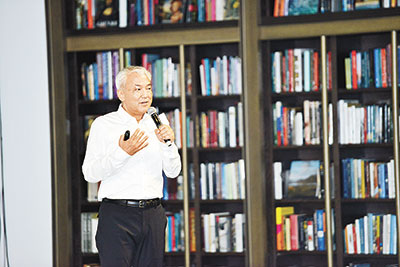
Debra Li Debra_lidan@163.com WHILE other brick-and-mortar retailers worldwide are struggling to retain their market share against the encroachment of online stores, one miracle Japanese bookstore chain has defied the odds and continues to grow. In 1983, the first Tsutaya opened its door in Osaka. Conceived as a lifestyle store by Muneaki Masuda, Tsutaya started out renting and selling books, music and videos. With 812 stores nationwide and annual sales of printed materials exceeding 130 billion yen (US$1.16 billion), the Tsutaya chain today still handles books, magazines, music and videos. Culture Convenience Club Co. (CCC), headquartered in Ebisu, Tokyo, the company behind Tsutaya, is now the largest bookstore operator in Japan. Masuda, founder and CEO of CCC, gave a lecture sharing the secrets to his success at Artron Art Center in Nanshan District last Wednesday. “The artistic design of a bookstore and the quality time people can spend in it are what online stores cannot provide to customers,” Masuda said. “Scrolling down on your mobile screen cannot give you that leisurely, comfortable experience of visiting a nice bookstore.” The Tsutaya bookstore in Daikanyama T-Site, a shopping mall run by the company, is recognized as one of the top 20 most beautiful bookstores in the world. The bookstore is designed to appear as if it is a simple study in one’s home. It has all the price tags, the lighting typically used for stores and cashiers removed from the place. People can literally read books and drink coffee at the store as if they were at home. Another Tsutaya bookshop specialized in art publications housed in Ginza Six, a high-rise shopping complex in Tokyo, features hand-ground coffee from Starbucks and a 300-year-old bonsai. So many people came on the day it opened in April 2017 that some waited two hours before they could enter the bookstore. Wang Shi, a real estate entrepreneur and art collector, said he is a big fan of Tsutaya. “You do not just buy books at the store,” he said. “It’s a nice place to drink coffee, catch up with friends and even talk with business partners.” The T Card, the membership card of Tsutaya, works as a platform for a cross-industry loyalty program. So far, more than 60 million holders of the card — about half of the Japanese population — earn “T Points” at FamilyMart, Book Off, Lotteria, and other retailers as well as Tsutaya shops. “Every detail of Tsutaya stores is carefully planned with a human touch,” said Wan Jie, chairman of Shenzhen-based Artron Group. “Successful Japanese companies are insightful in detecting the needs of customers and they are brave to try new stuff,” he said. “Besides reaching out to different sectors related to books, Tsutaya’s success is indispensable from combining art and design into its operations. It has reinvented itself as a trendsetter of a lifestyle instead of just a bookstore,” he said. Artron, a leading company in art printing, will cooperate with CCC on a “60 Big Art Books” project, Wan also revealed. In March, CCC acquired Japan’s publishing company Tokuma Shoten, whose empire once encompassed music, film and video games. | 
